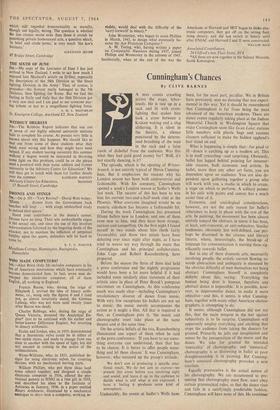HOMOSEXUALITY
SIR,--Ian Gilmour writes that Lord Devlin has been brilliantly demolished by Professor Hart in Law, Liberty and Morality. Lord Devlin buttressed his argument by examples from the criminal law to demonstrate that the law does enforce morality as such, and cited the rule that consent of the victim is no defence to a charge of murder or assault. Professor Hart seeks to persuade us that these are 'pieces of paternalism' designed to protect individuals against themselves. This is a specious distinction whereby Professor Hart tries to mask actual situa- tions where the law enforces morality and nothing else, by the application of the expression 'pater- nalism' to describe them. When the law punishes as a murderer a man who kills another with his consent, it enforces the moral values of the com- munity against the different values of the persons involved the fact that society thinks that these individuals require to be protected against them- selves is simply to state a result of society's view of their conduct as immoral. It could equally be said that society punishes homosexuals to protect them against themselves.
Professor Hart has, of course, contended that even if the English criminal law does yield ex- amples where the law enforces morality as such, this is not to say that this ought to be so, but even he concedes the efficacy of an argument that would show him to be enunciating a principle inconsistent with a position to which the English criminal law has been led by experience.
The question whether homosexuality between con- senting adults in private should remain a crime is to be determined not by reference to an unreal distinction between self- and other-regarding acts, but by considering whether the evil undoubtedly involved in the application of criminal sanctions to homosexuality would be less or more than the evil that would result from their removal. The present law does lead to blackmail as well as the unequal treatment of like cases : and the imprisonment of homosexuals is plainly unsatisfactory. On the other hand, it seems clear that to change the law would increase the incidence of homosexuality, would re- move a strong motive encouraging homosexuals to seek medical advice, and would leave more ex- posed to corrupt approaches those who otherwise would be better able to resist them. Also it is insufficiently appreciated that to change the law would not destroy blackmail, which would continue to flourish, though to a lesser extent, in a society
which still regarded homosexuality as morally, though not legally, wrong. The question is whether the law creates worse evils than those it avoids by punishing private homosexual acts, a question which, 'in brief and crude terms,' is very much 'the law's business.'
67 Bridge Street, Cambridge ALEXANDER IRVINE































 Previous page
Previous page